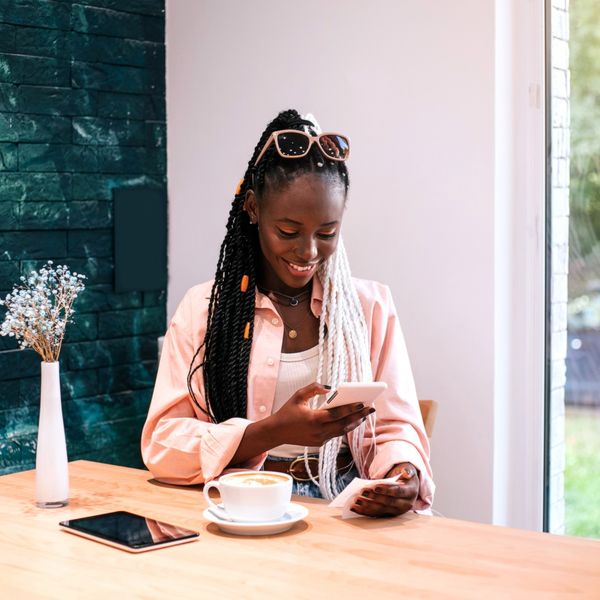There's something really rewarding about buying your first home.
You can finally throw the deuces to those pesky landlords and leasing agents that are telling you what you can and can't do in your own home, who you can invite over, and at what time of night. Not to mention that you're so tired of things breaking in your apartment or rental and having to wait for someone to realize that having a working toilet is kind of important, especially when you're throwing away paying your hard-earned money every month for a place that you barely even like instead of building your own equity.
But the truth is that as much as the American dream of being a homeowner has been sold to us, many millennials have no idea what it takes to actually buy a home for the first time. Sure, it can be a wonderful and exciting experience. The feeling of independence and stability is something that many look forward to as they begin to build a family. But it can also weigh heavy on the pockets with all of the costs that people forget to factor in, which is why it's important to do your research before signing on the dotted line.
Enter real estate guru Christian Ross, who has been helping young adults navigate the real estate market since her humble beginnings at a boutique real estate firm. Stressing the importance of first educating her clients on aspects of the real estate market such as looking as researching neighborhoods, looking at neighboring property values, and development history, Christian has become a tour de force in the industry. Her skills have even landed her a gig on television as a realtor for HGTV's House Hunters, where she helps combines her background in public relations with her real estate expertise to help buyers make get the best home at the best deal!
We teamed up with the real estate expert to get some tips and tricks on what to keep in mind when buying your first home (or buying again in this ever-changing market).
“First timers need to understand that they're going to be spending a lot during the home buying process," says Christian. “From hiring an agent, to paying for the home inspection, it costs a lot of coins up front to shop for a home. There's no window shopping in real estate."
Upfront costs are just one of the many things you should consider when buying a home! Check out more of the real estate gems we gathered from Christian.
Search the history of the neighborhood.
Read the local newspaper in the area to see what kinds of headlines are talked about- is there a new homicide per day, or are there softer pieces about the local community center's bake sale? Seeing what kinds of topics affect the community can tell you a bit about the activity you can expect.
Christian adds: "It's imperative to research the neighborhood. Know whether the community has historic buildings, or maybe the community is historic in itself- if it is you'll know that it may be a touristy area. Research the demographics, especially if you prefer diverse communities- that way you can know if you have a predominant race or class, or if it that area is a melting pot. Looking up census' past will give you insight into that kind of information."
Look into local politics.
You'll want to see how actively the local politicians are involved with the community- either with the schools or attending community events. This will let you know whether these politicians are in office to make effective change in the neighborhood, or whether they have larger political aspirations. If it's important to you to have local politicians deeply rooted in the community, you'll want to see their voting history, political campaigns, and the programs they implement at the grassroots level.
Christian adds: "Be sure to research gentrification in that area. Especially in neighborhoods that were previously known for being the “bad side of town", check out what gentrification may have done to the area. See where it may have pushed the homeless population, sex offenders, and things like that so you know how close those populations may be. Also, see if the area is being taken over by large corporations or hipster shops and businesses."
Research the nearby school system.
If you have children who will be attending the school(s) in the community, checking into the quality of the schools is something you'll want to invest time into. Even if you don't have children, the nearby school district still has an effect on you. A good school district increases a home's value, while a poor district may affect the value of the home. It also plays into property taxes, and whether you can expect levies to be on the local ballots, which also affect your taxes.
Christian adds: "Schooldigger.com is a great tool that gives you an in-depth analysis about the PTA, teachers, and community involvement in the school district. It's great to know about the district so you know what kind of education your child will be getting, and how well the relationship is between the school and the community. If you don't have kids, it's still good information to know so you can know what to expect as far as what issues may be on ballots (as far as levies go), and also what to expect as far as taxes in the area because of the district."
Look at local attractions.
Researching the things that are in your surrounding can give you a good idea of how conveniently things are located near you. A local tourist attraction will provide diversity in the area. It will also affect the prices if the options are slim. Pick an area where you have varying options in shopping and things to do, in an effort to save money and traveling time.
Christian adds: "You'll definitely want to look at the cost of living in the area. Your community may have a pretty high standard of living if there's a tourist attraction nearby. It also helps to look at things like that so you can see how much direct access you have to resources (or maybe not have). See how far the stores you frequent are from your home, or if your community has specialty shops. If you religiously shop at Whole Foods and the nearest one is an hour away, you may not want to choose that community."
Research local neighborhood organizations.
Seeing what organizations, whether nationally or locally, are active in the community can give you a sense of what kinds of issues are important to that particular area. For example, if the Boys & Girls Club of America has an active chapter in your area, you can tell that the care of children is something that the community actively supports. These things can indicate the kind of community you're entering, and you'll be able to determine whether your personal values align with the core values of the community.
Christian adds: "Check out the neighborhood meetings, town halls, request the minutes of homeowners association meeting to see what the local politics are like and how involved the community members are in decision making. If social collaboration and activism is important to you, you'll definitely want to see what that relationship is like between citizens and the local government."
Visit at various times of the day.
Checking out the neighborhood at different points throughout the day can let you know various details that are time-sensitive, specifically traffic. Pick a Monday, Friday, and weekend to stop by the area to see the changes in these patterns.
Christian adds: "Go by at night to see how safe a community may feel. Drive through on the weekend to see what the activity is like on a non-workday. Real estate agents don't know about those kinds of things because they don't live in the neighborhood themselves. Visit the area at different times to get a well-rounded idea of what the neighborhood may be like. Is it quiet during the day but rowdy at night? Are the weekdays pretty low-key, but the weekend brings the noise from neighbors who like to party? Is the neighborhood big into yard sales and letting kids host lemonade stands? Visit at different times to see how active it may be at any given moment."
Get a home inspection.
Upon making a serious offer, you should schedule a home inspection in order to judge the quality of the home and to expose any hidden issues. A home inspection will give you insight into the home you wouldn't be able to see with your eye, and can reveal things you wouldn't have thought of inspecting but are crucial to the buying of the home. Standard home inspections include reviewing the heating system, central air system, interior plumbing, electrical systems, insulation of various parts of the home, and tests the home's foundation and other structural components.
Checking these various elements are crucial to preventing unexpected surprises and buying a home that had pre-existing conditions that, once you sign, are up to you to fix. By identifying the major repairs that need to be made beforehand, you can demand that these repairs be made by the seller, or that they reduce the price of the home.
Christian adds: "The most important thing you can do is get a home inspection because it allows you to really see what you're going to get. You'd rather spend $400 for the inspection and find out there's a $10,000 problem than to buy the home, then find out all of the money you'll have to come out of pocket for on top of what you just spent to buy. An inspection is a snapshot of the home and can be a negotiating tactic as far as getting things fixed before you close, or maybe even lowering the price. If you have to put $10,000 into renovations, maybe ask them to either lower the selling price or make the renovations themselves."
Have a sit-down with the sellers.
Even though you talk to the sellers on a regular basis, having a sit-down conversation over coffee may give you specific insight into their experience in the home and community that will help you determine whether or not you truly want to live in that neighborhood. Discussing the seller's experience can help you determine if you want the same experience.
Christian adds: "If they're willing to do it, go for it (though their agent may be hesitant). Maybe it'd be a better idea to have this talk closer to closing, but definitely consider having a conversation with the sellers about their experience in the neighborhood. You'll get a better picture of the neighborhood, and see if their experience is one you're wanting to have in the home and in the area."
Is it worth the money?
Asking the sellers the kinds of taxes, insurance, upkeep costs (like landscaping and painting) and homeowners association dues they had to pay can let you know if there are any extra expenses added in when buying the home. Knowing these kinds of additional expenses can let you know if it's worth the investment.
Christian adds: "Make sure to find out what other expenses come with the home. Make sure you're getting out of it what you're putting into it. Another key here is make sure the taxes are up to date on the property and there are no hidden fees that will pop up once you sign. Get a clean bill of financial health on the home, and make sure it's worth your money before you close."
What's the market like in the area and surrounding neighborhoods?
Asking if there are foreclosed homes nearby is something that sellers don't particularly like to be asked, but it's crucial to the value of your home. Foreclosed home are usually low in property and buying value, and many foreclosed spaces turn into low-rent homes, meaning that you may constantly have new neighbors and the property value will remain low. If the property value of other homes in the area is low, you may be able to negotiate the price of your own home and offer a significantly reduced figure.
Christian adds: "Ask, or do your own research, on what other homes are going for in the area. This is another situation in which you want to make sure that the money you're about to put into the home in actually worth it. Some sellers try to make back their mortgage plus some on a home, so make sure you're not getting gypped."
Christian's Final Tip:
"Meet with a loan consultant before you even begin searching for a home and see what you truly qualify for (in terms of financing a home) and what's really in your budget. Also, make sure you have a solid understanding of how your loans and mortgage break down. It's always good to get approved for certain loans before you even consider buying a home that you can't pay for otherwise."
Pro Tip: You can use your 401K towards your down payment! Make sure that's one of the many options you explore with your loan consultant and your real estate agent.
Did we miss something? Share your home-buying tips below!

























